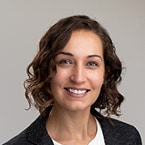AACR-QuadW Foundation Fellowship for Clinical/Translational Sarcoma Research
The AACR-QuadW Foundation Fellowship for Clinical/Translational Sarcoma Research represents a joint effort to encourage and support a postdoctoral or clinical research fellow to work on mentored sarcoma research and to establish a successful career path in this field. Funded research may be translational or clinical in nature.
2024 grantee

Research
Liposarcoma (LPS) is an informative model to investigate dysregulated differentiation given its well and dedifferentiated subtypes (WDLPS, DDLPS). WDLPS transitions to DDLPS in 25% of patients, leading to metastatic disease, but the mechanisms governing the transition are poorly understood. Dr. Pimenta utilized single nucleus RNA sequencing to compare 23 adipose, WDLPS, and DDLPS patient samples, and this analysis revealed loss of IGF1 signaling in DDLPS. In normal adipocytes, IGF1 autocrine signaling maintains differentiation, therefore, this proposal will investigate whether restoration of IGF1 signaling in DDLPS results in terminal differentiation and a less metastatic phenotype. In Aim 1, Dr. Pimenta will measure the effect of exogenous IGF1 on DDLPS morphology and behavior in vitro. In Aim 2, external DDLPS bulk RNA-sequencing datasets will be analyzed to assess if IGF1 loss predicts metastatic disease. Completion of this proposal will elucidate the role of IGF1 in liposarcoma and determine its utility as a prognostic tool and novel therapeutic target.
Biography
Dr. Pimenta obtained both her bachelor’s degree in molecular biology and medical and doctorate degrees from Rutgers University. Her thesis work focused on transcriptional programs that govern disease behavior and immune response in solid tumors. Dr. Pimenta completed a combined internal medicine and pediatrics residency at Brigham and Women’s and Boston Children’s Hospitals in 2020. She is clinically and scientifically focused on sarcoma pathogenesis and immune evasion, leveraging both computational and molecular biology approaches. Dr. Pimenta is currently a medical oncology fellow at the Dana-Farber Cancer Institute.
Acknowledgement of Support
“I am extremely grateful and honored to be awarded the AACR-QuadW Foundation Sarcoma Research Fellowship in Memory of Willie Tichenor. In the sarcoma clinic, many patients have asked me why there is a relative lack of data about this group of cancers. Becoming a sarcoma-focused physician-scientist has allowed me to proudly tell my patients that sarcoma research is active and state-of-the art. This award means so much to me because it allows for the continuation of this necessary and important work, with protected research time to pursue excellence in biologic discovery. I am very thankful to all who made this possible.”
2023 grantee

Research
Rhabdomyosarcoma (RMS), the most common soft-tissue sarcoma of childhood, is comprised of two major subtypes: fusion-positive RMS containing PAX3/7-FOXO1 translocations and fusion-negative RMS characterized by RAS pathway activation. Survival rates of patients with refractory or relapsed disease drop to < 20%, with little improvement seen in treatment options in the past four decades. Cancer stem cells, drivers of relapsed/refractory cancers, have been recently identified in fusion-negative RMS. Dr. Eng aims to characterize the mechanisms by which specific transcription factors regulate human fusion-negative RMS growth and cancer stem cell function. This may lead to novel therapeutic targets to prevent relapse in RMS patients.
Biography
Dr. Eng completed her doctoral degree in the Department of Molecular Medicine and Pathology at the University of Auckland, New Zealand. Her work was focused on elucidating the developmental origins of lymphatic vessels, understanding the mechanisms regulating lymphangiogenesis, and developing novel antilymphangiogenic therapies to prevent lymphatic spread of tumor cells. She is currently continuing her training in cancer biology as a postdoctoral fellow at Massachusetts General Hospital.
Acknowledgement of Support
“My goal is to become an independent pediatric cancer biologist who specializes in uncovering novel therapeutic targets for curing children with sarcoma. The support gained from this fellowship is an important and invaluable contribution to my ongoing development as a researcher and assists with my transition into an independent investigator.”